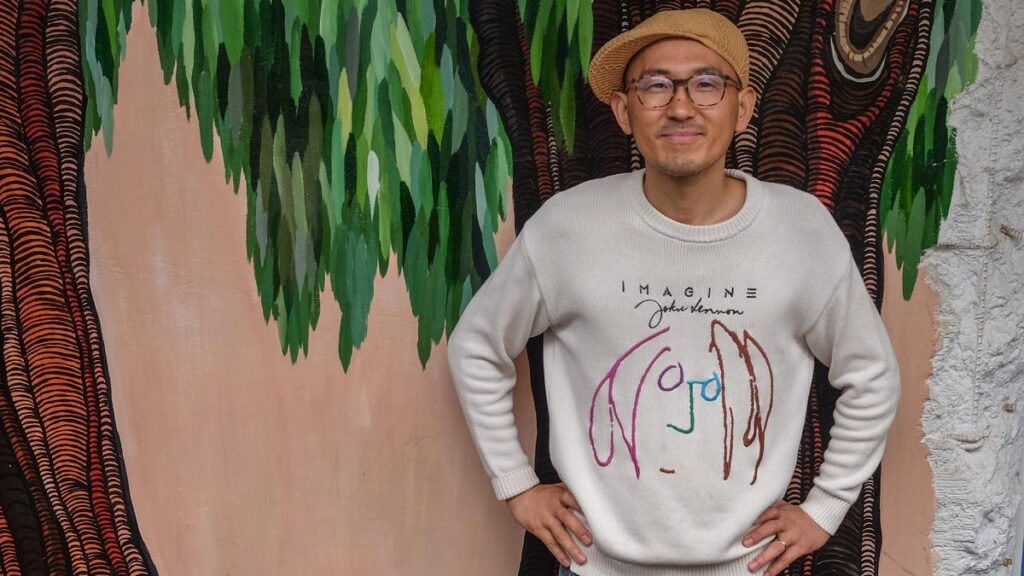It’s early in the morning in Gwangju, South Korea’s fifth biggest city and the capital of the south western province of Jeolla-do. But from the cafe I am sitting at, I may as well be inside a traveller’s dream.
I’m having a perfectly hand-dripped coffee made with Central American beans as suave Japanese animation piano music plays over breakfast. I glance at a forest-green-painted support beam plastered with magnets from dozens of cities all over the world.
Around me, Turkish lanterns are set next to Middle Eastern rugs, a Bintang Beer wooden sign from Bali, and trinkets from Vietnamese markets. Just above my shoulders, a big, recessed bookshelf carries dozens of classic Lonely Planet guidebooks piled high in neat vertical rows.
These travel bibles from the 2000s cover places as diverse as Mexico and Mongolia, Africa on a Shoestring, Taiwan, Australia, Spain, and, of course, several editions of Korea.
Tucked in a quiet backlane and five minutes’ walking distance to the Ssangchon Metro station, almost at the centre of Gwangju’s only transversal underground line, Voyagers Cafe is a timeless space, and feels akin to what anthropologists define as a “liminal zone”— a place where reality fades, things become borderless, in transition, and especially “in-between” reality and something else.
“After travelling for a couple of years in Australia, Europe and parts of Southeast Asia, I faced the harsh reality of having to go back home to Gwangju and finding the proverbial day job,” says Pedro Kim, the eternally smiling and soft-spoken owner of Voyagers, which sits below the cluster of immaculate rooms and one dorm that make up Pedro Guesthouse II, Gwangju’s travellers accommodation of choice.
“I was so alienated by the prospect of joining the ranks of Korea’s office life,” continues Pedro.
“I wanted to give a better sense to my life and keep stoking my travelling dreams, but obviously I also faced society’s pressure and my parents’ concern — what could I do?”
In the end, 13 years ago, Pedro took quite the proverbial leap of faith. With considerable moral pushing and shoving, he convinced his family to let him open Pedro Guesthouse I from a small apartment they own. It still operates a couple of lanes behind Voyagers Cafe’s current location.
“I started small with just a double room and two little dorms, and worked hard to put myself on the map as Gwangju’s first international traveller-focused guesthouse,” he explains, “practically only accepting foreign travellers.”
In a matter of years, during which Pedro worked hard, only taking the month of December (among the coldest and slowest for business) off to keep seeing the world.
“Wherever I go, I bring back things to furnish the guesthouse and the cafe, and that’s how Voyagers has become a place for locals to come and dream travel with me,” he says, just before rushing back behind the bar to attend to a middle-aged Korean couple who enter, look around, pick a table, and order coffee and cake.
“Many of my customers are actually Korean, from the neighbourhood,” he says after serving them with attention.
“They love to come here and enjoy Voyager’s unique atmosphere, and often have questions for me: have you been to this or that country? Is it safe? How can I travel better there?”
Most Koreans want to travel, but many cannot even imagine going abroad, given how little time off work they can afford. Most have to dream about it and postpone plans until retirement age.
“The neighbourhood knows I have been around and come here for coffee and even more for questions: imagine, I am the friendly travel consultant bartender,” quips Pedro.
“My customers don’t just buy coffee and beers here, they buy fuel for their travel dream, and I am most happy to guide them.”








https://thewest.com.au/travel/pioneer-traveller-living-the-dream-in-south-korea-c-20505302


